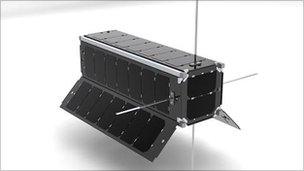Glasgow-based space company secures £1m expansion cash
- Published

Clyde space is expanding its CubeSat capabilities with UKube1.
Glasgow-based Clyde Space, a leading provider of miniature spacecraft, has secured a funding package worth £1m.
The company produces high-quality, high-performance systems for very small spacecraft called "CubeSats".
A type of miniaturised satellite, it was originally developed to help universities worldwide to perform space science and exploration.
Clyde Space, which was formed five years ago, has a 30-40% market share of the global CubeSat power market.
The company aims to expand its CubeSat capabilities with UKube1, a 5kg satellite being developed and built in Glasgow in conjunction with Strathclyde University for the UK Space Agency.
It is the largest indigenous space company in Scotland.
About 50% of turnover at Clyde Space is from the sales of power components for larger spacecraft, including power controllers, batteries and solar panels.
The company has a global customer portfolio including the European Space Agency and US-based customers such as Nasa and the US Air Force. It also has customers in Turkey, South Africa, India, China, South America and Canada.
'Absolutely delighted'
The £1m investment package was led by private equity firm Nevis Capital and included funding from Coralinn LLP.
Nevis focuses on deals up to £10m and recent investments included Shetland Wind Power and Dieselec Generators.
Corlalinn was founded in 2010 as the investment vehicle of Hugh Stewart OBE, the former executive chairman of Caledonian Alloys Group - a premier aerospace recycler.
Additional funding from Scottish Enterprise, the Science and Technology Facilities Council (STFC), the Technology Strategy Board and Regional Selective Assistance was included to support innovation and growth across all company activities.
Clyde Space founder and chief executive, Craig Clark, sits on the UK Space Leadership Council. He said: "I am absolutely delighted with the funding package."
- Published22 June 2010
- Published10 January 2011